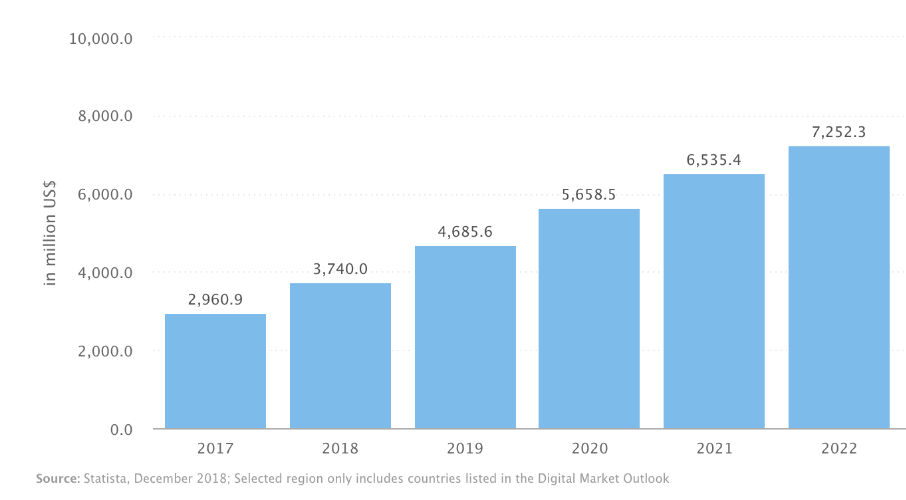The Rise of Micro-Investing: Building a Portfolio With Less Than $100
Investing is an exciting, dynamic, and very challenging way of building personal wealth from the comfort of your own home. But don’t buy into the mistaken perception that honing your skills in stocks is only viable for those of us who are already fortunate enough to be sitting on masses of money. With the rise of crowd investing and crowdfunding, the industry is becoming more accessible to everyone. For example, the crowd investing market is expected to reach $7 billion in transaction value by 2022.

Image Source: Statista
Investing is open for anyone with an interest and ambition in dipping their toes into the market and broadening their profit margins. All you need is a tiny amount of money, even if it’s less than $100, to get started with. Here’s how:
Utilize the tools available to you
It’s vital to build yourself a diverse portfolio, but as a newcomer to the world of investments, the wisest move you can make is to utilize the online tools available to you in order to make informed decisions on where your money should go.
When starting on a shoestring budget, your primary concern should be in finding reliable low-risk investments and properly diversify them into various markets, and there are plenty of online platforms available that have the power to help you decide where your money should go.
If you’re looking to set up an investment portfolio for less than $100 and properly diversify investments into stock, venture, real estate, ETF, and ICO markets, it’s important to find a service that can intuitively cater for your needs and help you find your feet in a fast-paced industry.
One such company that’s designed to help ease you into the world of investments is blockchain platform Roobee.
With just $10 needed to start investing, you can utilize the platform’s statistics to invest your money wisely. The high level of accuracy in investment return data is made possible through AI algorithms and blockchain technology. As part of the former Roobee is betting on robo-advising that ensures the automatic management of portfolio compiled of only verified market companies like Apple or Airbnb, so that even smaller investments could be diversified professionally. The robo-advising market is getting more popular in fintech industry and is forecast to grow into an $8.1 trillion industry by 2020.
Image Source: Roobee
Robo-advisors specialize in spotting trends that human eyes struggle to identify and help users to make intelligent decisions when it comes to investing their money.
Another example of a micro-investing platform is a popular app called Acorns. The tool allows people to micro-invest in some of the biggest brands in the world, including Apple, Nike and Uber. They also have a debit card that you can use to spend the profits.
Many newcomers to the investments market make the fatal error of ignoring the data available to them and following their instincts alone. Such action risks turning investments into nothing more than a blind gamble, and when you’re entering the industry on a small budget, it could ultimately prove fatal for your endeavor if you don’t tap into the tools that are on hand to help.
Budget wisely
As a newcomer to the world of investment portfolios, it’s important to exercise caution when entering the market. You can have the most intuitive tools in the industry at your disposal, but accidents and unforeseen fluctuations can happen.
Be sure to work on building an emergency fund to prevent you from developing a dependency on your investments. Sure, starting with less than $100 may seem risk-free when you begin, but as your profits build, it’s important to remember to avoid counting your chickens before they hatch. If the money in your portfolio is invested, don’t assume that it’ll always be there.
Consider ETFs
Exchange-traded funds (ETFs) are a good way of helping new investors find their feet in the markets. They can be commission free, and act as mutual funds that trade on exchanges like stocks – meaning that they are not actively managed.
This makes ETFs into an excellent low-cost investment, and there are even trading platforms that focus on specific sectors, like financials or technology.
If you’re still pondering how to or where to invest your money, then ETFs are a solid platform in which to begin. They also provide automatic diversification, which prevents you from having all your eggs in one basket.
Make sure you do your homework before entering the world of ETFs. Some charge commission while others are commission-free. There may also be fees for some funds, so it’s worth taking a moment to fully understand what your investment is costing you.
Look for savings on commission
When investing on a budget, paying excessive commission fees can leave your portfolio looking hamstrung before you even have a chance to get started.
Keep on the lookout for commission-free platforms that don’t charge users premiums per transaction.
Without commissions on-hand to eat away at your investments, you can benefit from the added freedom of trading without the fear of a surcharge for every move you make in the market



